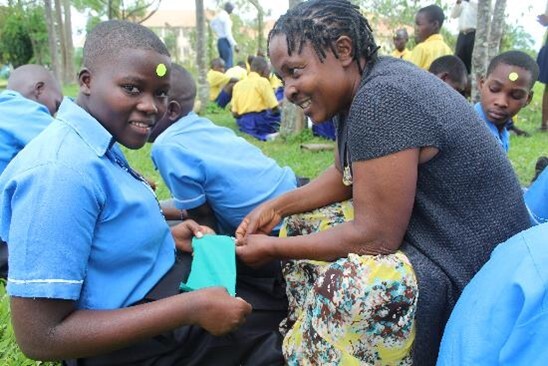
People continue to treat menstruation with shame and hesitate to talk about it, yet it is something natural and normal. Besides, some cultural and religious beliefs have made menstruation seem dirty, unacceptable and a shameful process, which demeans and compromises a girl's social standing.
Published on: 20/11/2023
“I cannot believe I have a finished product! I just realised how easy it is to make reusable sanitary towels even when I do not have any tailoring skills,” said Jane, a schoolgirl aged 11 at Rwankenzi Primary School.
Just like other adolescent girls in school, Jane desires safe hygienic materials and a conducive environment to have her period with dignity. However, access to proper menstrual hygiene management remains a challenge in most schools with sanitary pads and safe hygienic hardly affordable. Adolescent and older girls do not have clean and dry changing materials such as pads to change every six hours. They also lack gender disaggregated toilet facilities with incinerators and bathroom spaces to wash up when they need to, nor hand washing facilities with soap to clean themselves before and after changing pads.

People continue to treat menstruation with shame and hesitate to talk about it, yet it is something natural and normal. Adolescent girls are usually stigmatized by their male counterparts during their menstruation periods. This is mostly because they are ignorant about the fact that menstruation is normal. Besides, some cultural and religious beliefs have made menstruation seem dirty, unacceptable and a shameful process, which demeans and compromises a girl’s social standing. This not only poses serious health risks to the girls such as reproductive and urinary tract infections, potential future infertility, and birth complications, (Omidvar & Begum, 2010; UNESCO, 2014), but also impacts their educational chances through absenteeism and school drop out before they even complete primary level education (IRC & WSCC report, 2012). Raising awareness on appropriate menstrual health and hygiene (MHH) management and practices is paramount to tackle the often-associated stigma as to build a world where no girl is held back.
In 2021, the Ministry of Education and Sports in Uganda launched the Menstrual Health and Hygiene Strategy to improve MHH programming and response for girls and women of menstruation age in the country. Through a collaborative approach, this year Kabarole District Local Government (KDLG) and school WASH partners supported this agenda by promoting MHH locally on 22nd June 2023 at the district headquarters in Kitumba with three schools participating. The engagement involved 18 district officials, 16 school representatives (Headteachers, Senior women teachers, patron teachers, Chairpersons SMC), 270 learners, NGO (Non-Governmental Organization) representatives including IRC and AMREF-FINNISH Mondial.
The Kabarole LC V chairperson Kabarole, Mr. Richard Rwabuhinga, the District Education Officer, Mr. Rujumba and other dignitaries addressed concerns around multistakeholder involvement. They emphasized that all stakeholders including the central government, district officials, school management teams, parents, leaners, and other duty bearers have key responsibilities in promoting and advocating for improved MHH management and practices for enhanced health, education, and social outcomes.
During the sessions, the secretary for Health and Education, Assistant District Health Officers, District Health Inspector and Senior women teachers oriented and practically trained all participating girls and boys aged 10-15 from the 3 schools on how to make re-usable handmade sanitary towels. After the sessions, all trainees proudly displayed their finished products. To ensure sustainability, locally available materials were used to make the pads because learners come from homes that may not afford disposable pads. Learners were also granted moments to perform educative poems, drama, skits to further create awareness on MHH. Disposable and reusable MHH materials were also supplied among the participating schools’ management for further distribution to girls in the menstruating age.
The engagement contributed to breaking the silence around menstrual periods and raising awareness on the importance of menstrual hygiene for girls in schools.
“We should have a bold, positive conversation and approach to discussions on periods, as well as more respect and care from boys. Mind you we are all products of a missed menstrual period,” says Tukahirwa Anna ADHO- MCH KDLG.
Moving forward, the school WASH systems fraternity is encouraged to further strengthen capacities of all duty bearers ensuring that MHH is fully integrated in WASH services promoted in schools so that a girl child’s health, ambitions, and dreams are not shattered due to menstruation related issues.
This article is the writer’s product after participating in the WASH storytelling write shop, organised for regional partners, and facilitated by IRC Uganda as one of the in-country learning and documentation commitments under the One For All alliance.